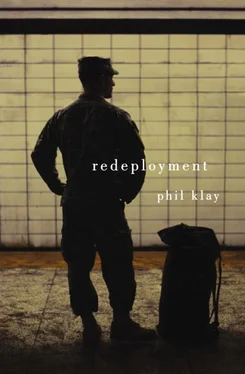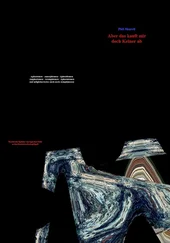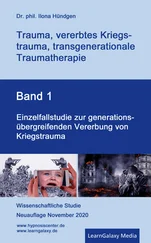Rodriguez paused. “Fuji played the game,” he repeated. “You know we’re back up top for most contact?”
“And the day Fujita died…”
“There was a sniper. There wasn’t shooting. There was one shot. I helped Ditoro put Fuji’s pants back on while Acosta tried to stop the bleeding.”
“And then Garrett…”
“They IED’d us while we were bringing Fuji back.”
Rodriguez lowered his head and stared at the ground, clenching and unclenching his fists. He grimaced, then looked straight at me, challenging.
“If you killed somebody,” he said, “that means you’re going to hell.”
Marines had asked me about that before, so I thought I had an answer. “Killing is a serious thing,” I said, “no doubt about that. And—”
“I mean”—Rodriguez looked away, down at the candy—“somebody you’re not supposed to.”
That brought me up short. At first I didn’t understand what he was talking about, though I suppose it should have been obvious. “You’re not responsible for Fujita’s death—”
“That’s not what I’m talking about,” Rodriguez snapped, eyes back on me, angry. “I mean, not Marines. I mean, out in the city.” He took a breath. “And, if other people did it, too, when you’re out there, and you don’t stop them. Do you go to hell, too?”
The silence held for a moment. “What are you telling me, Lance Corporal?” I said it in an officer voice, not in a pastoral voice. Immediately, I knew it was a mistake.
“I ain’t telling anything,” he said, drawing back. “Just asking.”
“God always offers forgiveness,” I said, softening my tone, “to those who are truly sorry. But sorry isn’t a feeling, you understand. It’s an action. A determination to make things right.”
Rodriguez was still looking at the ground. I was cursing myself for fumbling the conversation.
“A lance corporal,” Rodriguez said, “don’t have the power to make anything right.”
I tried to explain it wasn’t about outcomes, which you can’t control, but about the seriousness of intent. Rodriguez cut me off.
“If this is confession,” he said, “that means you can’t tell anybody what I said, right?”
“Yes.”
“Then it’s not confession. I’m not confessing shit. I ain’t sorry for shit. You can tell anybody you want.”
• • •
I spent that nightthinking over what Rodriguez had told me, parsing the words until I wasn’t sure he’d said anything at all. I kept thinking, They only shot when shot at. That seemed to be what he said. Maybe he was talking about a traffic stop where they killed a family that failed to brake in time. That sort of thing tore Marines up.
“Don’t let this upset you,” David had said about the death of Uriah, “the sword devours one as well as another.” I built up a scenario where Rodriguez was talking about a bad judgment call, not a real violation of the ROE. That story ran through my mind enough to let me know I was avoiding the issue. By the next day, during morning prayers, I found my resolve. A coward, I thought, would tell himself it was all right. So I had to talk to someone or be a coward. Less than a priest. Less than a man.
But who to talk to? The obvious choice was to go to the company commander, who’d have the authority to step in. But Rodriguez’s company commander was Captain Boden, and Boden was a lunatic. And if the rumors my RP told me were true, he was an alcoholic as well. Possibly self-medication for PTSD. Boden’d been in Ramadi in 2004, and his unit held the record for most casualties in the division. When you were in conversation with him, the first thing you’d notice was the abnormal eye contact—aggressive staring and then quick, paranoid looks around the room. His affect was off, too, alternating between quiet periods of deep sadness and barely suppressed rage. And he had vicious scars across his face—battle scars that gave him immediate credibility with his Marines. The man knew combat.
I wasn’t the only one who thought there was something off with Boden. He’d seriously disturbed the trainers at Mojave Viper, the month-long predeployment workup in the California desert that the Marine Corps uses to prepare units for war. “These are a people who do not understand kindness,” he’d told his company during a brief on Iraqi culture. “They see kindness as a weakness. And they will take advantage of it. And Marines will die.” Charlie Company took his advice to heart, roughing up several role players during training. These were Iraqi Americans who dressed up and strolled through fake villages, playing either civilians or insurgents. If you followed Charlie on a practice cordon-and-search, you’d hear Marines screaming, “Put that bitch in the chair!” or, “Shut that motherfucker up!” to the civilians. When one of them lectured Charlie on how that style of counterinsurgency wasn’t likely to win hearts and minds, Charlie found the complaints funny. Even funnier was the trainer from Civil Affairs who told the whole assembled battalion, “I’m very concerned that this battalion is overly focused on killing people.”
You could see smirks everywhere. “I guess that pogue thinks he joined the fucking Peace Corps,” I heard Boden stage-whisper to his first sergeant, loud enough for the Marines around him to hear. “Oh no,” he continued in a mocking, high-pitched voice, “some real men might go out and kill some al-Qaeda. But I just wanna be friends.”
That was his attitude before his company got dropped in the most violent sector of the most violent city in Iraq. I couldn’t go to Captain Boden. He wouldn’t care, and he wouldn’t want me, a chaplain of all people, meddling.
Who else? The battalion commander wasn’t much better. Lieutenant Colonel Fehr was universally loathed among the staff and paid attention to none of them. Before the deployment, before I’d even met him for the first time, our operations officer, Major Eklund, had felt the need to prepare me.
“He’s gonna do this handshake,” the major said. “It’s called the dominance shake. He does it to everybody.”
Eklund was a Catholic convert and had a tendency to tell me more than he should, inside the confessional and out.
“The dominance shake,” I said, amused.
“That’s what he calls it. He’s going to take your hand in his, grip it real hard, and then twist his wrist so his hand is on top of yours. That’s the dominance position. And then, instead of shaking up and down, he’ll pull you in and slap you on the shoulder and feel your bicep with his free hand. It’s Fehr’s little way of peeing on your personal tree.”
“You think he’ll do it to me? I’m a chaplain.”
“He does it to everybody. I don’t think he can help it. He did it to my nine-year-old son at the battalion Easter egg hunt.”
Then I met the colonel, got dominance handshook, and received the vague introductory pleasantries that let me know this commander looked at chaplains as the pray-at-ceremonies guys, not as trusted advisers. Fehr was worlds more composed than Boden, but he didn’t seem to care much for ROE either. Two months after our first meeting, I saw him interrupt a trainer at Mojave Viper going over escalation of force procedures.
“If a vehicle is coming toward you fast,” the trainer said to the assembled Marines, “it might be a suicide bomber, or it might just be a frustrated, distracted Iraqi trying to get to work on time. If the first couple steps of EOF don’t work, you can fire a round in front of the car, not trying to injure—”
Here’s where the colonel jumped up and stopped the lesson. “When we shoot, we shoot to kill,” he shouted. The Marines roared in response. “I’m not having any of my Marines die because they hesitated,” the colonel continued. “Marines do not fire warning shots.”
Читать дальше












